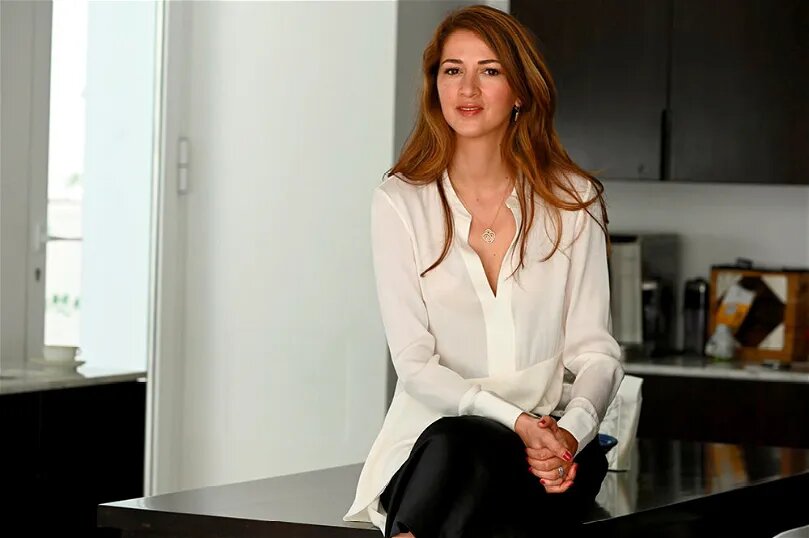The decision to revoke Rhazoui’s prize has been widely seen by critics as an application of double standards by French officials.
Simone Veil revoked the 2019 prize from former Charlie Hebdo French-Moroccan journalist, Zineb El Rhazoui, on Monday in response to a re-post on X that compared the Holocaust to the current Israeli massacres in the Gaza Strip.
“I will give you back your Siomen Veil Prize because it became tainted with blood,” Rhazoui, also a 2021 Nobel Prize nominee, said in a letter in response to Simone Veil’s decision.
Rhazoui also updated her X bio to “Simone Veil Prize 2019/withdrawn in 2023 for denouncing the Israeli massacres in Gaza.”
Rhazoui reposted a thread on Saturday which was published by American journalist, Benjamin Rubinstein, in which he visually compared Israeli Prime Minister Benjamin Netanyahu to former Nazi leader Adolf Hitler.
Rubinstein had also placed an image of the Auschwitz concentration camp next to the Israeli separation wall, saying, “The Zionists have perfected the science of genocide.”
“They improved the Nazi model,” he said.
The re-post angered French public figures, at the top of which the grandson of Simone Veil, Aurelien Veil, who called on Valerie Pecresse, a right-wing politician and mayor of Île-de-France, to revoke Rhazoui’s prize.
The prize also bears the name of Veil’s grandmother, who was a late feminist and Holocaust survivor.
“Each person is free to have their own ideas and make their own statements, and Madame El-Rhazoui is no exception. However, I cannot help but express my concern and dismay at seeing that my grandmother’s name is associated with the trivialisation endeavour that [El Rhazoui] explicitly stated,” Veil said in a thread on X, addressing Pecresse.
Rhazoui then responded on the social media platform with a long letter addressed to Veil and Pecresse, in which she vehemently stood by her opposition to the Israeli atrocities in Gaza.
“For me, the lesson from Simone Veil is that humanism always takes precedence over tribalism or politics. If the Simone Veil Prize means remaining silent in the face of the internationally condemned criminal actions of Netanyahu’s far-right government, I would be very happy to return it,” she wrote.
Pecresse then described Rhazoui’s repost as “outrageous and shocking” in a statement on X, citing it as the reason behind her decision to revoke the prize.
The decision to revoke Rhazoui’s prize was widely seen by critics as an application of double standards by French officials, who granted her the award when she criticised Islam through the controversial Charlie Hebdo magazine.
“When Zineb El Rhazoui criticised Islam, she was liked a lot, even too much, in France. But when she started denouncing the genocide in Gaza committed by the extremist and exterminating Israeli government, the same people who were applauding her just yesterday began to insult her,” Ali Mrabet, a Spain-based journalist, said in a post on X.
Pecresse, who lost the 2022 French presidential elections to Emmanuel Macron, has been at the centre of controversy.
Last year, Pecresse came under fire for referring to the “Great Replacement” conspiracy theory, which states that French Christians are being replaced by Muslim immigrants.
The theory is what inspired white supremacists in the West, including Brenton Tarrant, who killed 51 people at two mosques in Christchurch, New Zealand, in 2019.
In July, Pecresse ordered changing the name of a high school from American revolutionary, Angela Davis, to Rosa Parks, a Black civil rights activist.
She had defended her decision by saying Davis “does not represent the values of the French Republic” and accusing her of having views that “can encourage violence”.
Speaking to a committee in March, Pecresse also pointed to “Davis’s thinking that the conviction that racism is systemic”, denying that France has systemic racism.
“This may be true in the U.S., it was certainly true in the U.S. But in France it’s false and this idea, which could be supported by minority groups, is really an attack on French republican universalism,” she said at the time.
Meanwhile, France had upheld a ban on pro-Palestine protests on October 28, citing “the serious risk of disturbing public order” in light of “heightened tensions linked to the events in the Gaza Strip with a rise in anti-Semitic acts in France”.
Protesters defied the ban at the time and French police arrested 21 people and issued more than 1,350 fines on the same day, according to an AFP report.
The crackdown on pro-Palestine protests across Europe since the start of the war on Gaza has been a matter of concern by activists and rights organisations including Amnesty International.
France has been defending Israel’s so-called “right to self-defence” since the start of the aggression on Gaza on October 7, a stance that Tel Aviv’s staunch Western allies have echoed. However, Paris also called on Israel to halt the war.
Since October 7, Israel has killed at least 18,412 Palestinians in Gaza, 70% of whom are women and children, according to the latest figures by the health ministry in Gaza.
Euro-Med reported a much higher figure on Monday of 24,142, including 9,420 children and those who are presumed dead under the rubble. Israel has also displaced 1.8 million people, leaving them without food or shelter under the harsh winter season.







